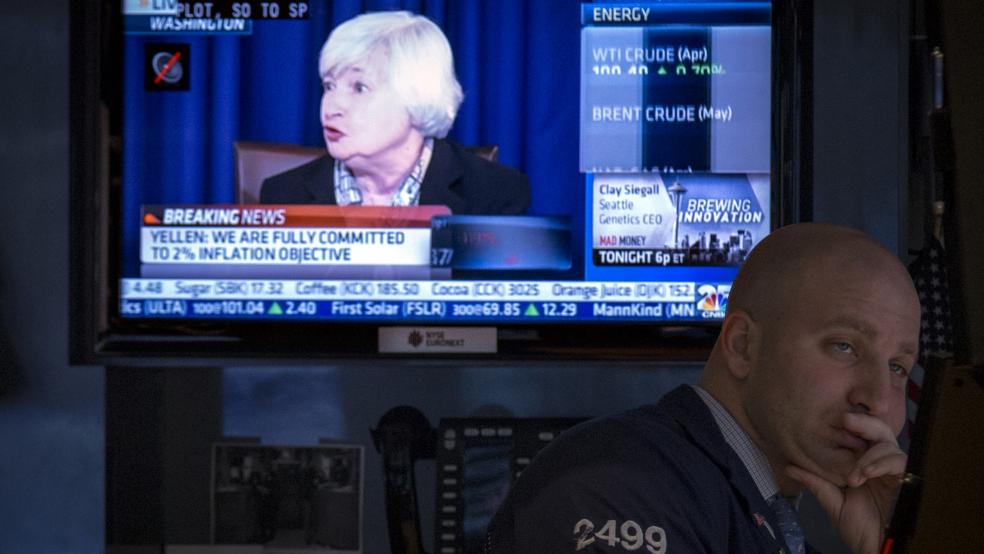Janet Yellen is taking a lot of flak for speaking her mind.
Last week, the Federal Reserve released a biannual policy report just as Yellen, the Fed’s chair, began testifying to Congress on the state of the U.S. economic recovery, the outlook for inflation and what’s happening in financial markets these days.
What Yellen had to say on the last of those factors sent many folks into a tizzy. The Fed views valuations in some parts of the market — especially for smaller social media companies and biotech stocks — as being “substantially stretched,” even after a “notable downturn in equity prices for such firms early in the year.”
In other words, in spite of all of Yellen’s reassuring words to the contrary in recent months, there may be some kind of asset bubble taking shape in at least some corners of the financial market.
Related: Janet Yellen's Choice — Market Bubbles or More Jobs
The last time that a Fed chairman stuck his head out like this was way back in December 1996, and it ended badly — very badly — for all concerned. Alan Greenspan was Fed head at the time, and his questioning about our inability to know when “irrational exuberance” inflated asset values to levels beyond which they could be sustained by fundamentals triggered a prompt and panicky selloff in stocks. Within months, however, the Dow Jones Industrial Average was setting a string of new records and Greenspan was left with egg on his face.
Greenspan wasn’t wrong, of course. The kind of “unexpected and prolonged contractions” he envisaged in his 1996 speech did show up — but not until early 2000, by which time the Dow had climbed 81 percent. Anyone who had listened to his warnings had forfeited a lot of money.
Burned by that experience, Greenspan never again spoke out to warn the public about bubbles taking shape in the economy or financial markets during his tenure at the Fed. Perhaps he simply didn’t see the giant credit bubble taking shape, as he himself later asserted. Or perhaps, as his critics argue — pointing to the fact that he’d been asked to comment on the possibility of a housing price bubble by Congress as early as 2002 — Greenspan simply figured that it was safer to stay on the side of the cheerleaders until it was clear that the bubble was deflating, having miscalculated the way in which it would end.
Rightly or wrongly, Yellen may have ignored that history by being as outspoken as she has, and she is attracting a lot of criticism for it — on several fronts.
Who made the Fed Chair an expert on social media stocks or small biotech companies? Does Yellen have the know-how to determine what constitutes a fair valuation for a fledgling biotech stock, some observers gripe?
Others go back to Greenspan’s “irrational exuberance” comment, and point out that the Fed doesn’t have a terribly good track record of getting macro calls like that right.
Related: Central Banks Ending Era of Clear Promises
Then there’s the argument that Yellen’s jawboning doesn’t seem to be working. Sure, social media shares got pummeled, but modestly. Twitter, which was already off its recent highs, fell less than 4 percent; Facebook, up 23 percent so far this year, recouped its losses to finish higher on the week. Similarly, the iShares Nasdaq Biotechnology Index ETF (NASDAQ:IBB), after slumping since the Fed comments came out, gained 3 percent on Friday, leaving it ahead 10.3 percent for 2014 and 29 percent over the last 12 months.
Here’s the bottom line: Yellen knows she is walking a very narrow line as she tries to guide monetary policy back toward some kind of “new normal” for the first time since the 2008 financial crisis.
Financial markets, clearly, have been rallying, even as the economy has been stumbling along. That has left the Fed stuck in an uncomfortable and perhaps ultimately perilous position of keeping interest rates low enough to not jeopardize growth, even if doing so risks creating fresh bubbles somewhere in the financial system.
The Bank for International Settlements has argued that “unusually accommodative” policies (translation: easy money) by the Fed and other central banks have been damaging, and that the continuation of this “unconventional” and “extraordinary” state of affairs involves an entirely new set of risks.
Clearly, Yellen’s Fed wants to do what it can to keep bubbles from forming while waiting on monetary policy changes — the adjustment of key interest rates — that could undercut some of the economic momentum that may be building. But just because we don’t need to fear that Yellen will quickly follow up her words with interest rate changes just yet doesn’t mean we shouldn’t pay attention to what she is saying.
Related: Janet Yellen’s Burning Interest Rate Dilemma
More than any other single individual in the U.S. financial system, Janet Yellen is in a position to see what is taking place in the economy and its financial markets, and to spot pockets of risk or overvaluation as soon as they appear. Sure, she may be early, and she’s unlikely to be an expert on specific stocks (why would anyone listen to a Fed chair on what specific stocks to buy, anyway?), but that doesn’t devalue her perspective.
Moreover, Yellen has been in Washington long enough and is smart and savvy enough to be aware of the ramifications of using words and phrases that bring back memories of Greenspan. The very fact that she’s doing so means that she probably sees good reason for speaking out.
That reason likely boils down to “caveat emptor.” Yellen, in her brief time at the Fed thus far, is telling investors to look out for themselves — and right now, she feels strongly enough about this particular issue to suggest it is something we might want to worry about. She, meanwhile, will keep worrying about the economy first and foremost.
Top Reads from The Fiscal Times:






